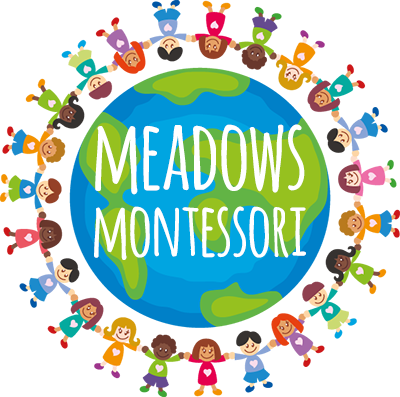Montessori pedagogics
Meadows Montessori – an introduction
The Montessori pedagogy was developed by Dr. Maria Montessori, the first female doctor in Italy, at the beginning of the twentieth century and is based on the recognition that children, following an inner developmental plan, are building themselves and undergoing various so-called sensitive periods. Sensitive periods are phases of particular susceptibility to learning contents of different kinds, phases in which the children acquire a certain learning content in a very short time, with absolute ease and sustainably (for example, a language).
The teacher can adapt the prepared environment in the Kindergarten on the basis of their observations and findings, in such a way that the child can always find materials which correspond to their current development and support their current learning steps.
The Montessori World comprises
5 environments:
Exercises of daily life or Practical Life
They are among the first activities in a Montessori environment and include a variety of domestic activities. They correspond to the sensitivity to movement and promote the development of coordinated fine and large motor movements. It is purely the doing, so the how of the movements and manipulations are important in this area. Activities in practical life serve the child`s inner development, especially physical, mental and moral development.
Montessori language
Working with the activities of practical life often brings things up for discussion for the first time. By dealing with the sensorial materials, perceptions become concrete and thus responsive. The aim is to promote language as a form of personal expression. At Meadows Montessori, this expression is in both in German and in English.
Montessori sensorial material
The meaning sensorial material is the support and refinement of the senses, the formation of order, the understanding of perceptions, the differentiation of structures. The material for developing the senses enables the child to classify, compare and describe impressions (weight, color, pressure, sound, smell). The materials (identities, contrasts, gradations) primarily serve the best possible development and expression of the human senses.
Montessori Mathematics
The exercises of practical life and the sensorial materials form the basis for the understanding of mathematics. The materials correspond to the sensorimotor needs and help the child with fascinating discoveries with numbers.
The goal of mathematics is the development of thought processes and the promotion of the "mathematical mind" (from the concrete to the abstract). It is about the "grasping" and the learning of the numbers and the payment system.
Montessori cultural and cosmic education
Cultural and cosmic education seeks to connect with all levels of life and offers children a wonderful opportunity to build understanding and friendship for other cultures and other areas of life. The children get an insight into the ecological nature and discover the meaning, the value and the responsibility for our world. The cosmic materials include, among others the areas: geography, music, art, natural sciences, biology and zoology.
To take advantage of the Montessori program, the children should visit Meadows Montessori at least 4 half days or 2 full days per week.
The development of your child
In the interest of the child, the parents and the Meadows Montessori,agree that the first 3 months are a "probationary period". After 2 months the parents are invited to discuss the probationary period of the child. Should either the child or the parents be unhappy, or if we experience problems as teachers, we together with the parents strive to find the best possible solution. .
Each year, the parents are invited to a personal parental meeting with the teachers to discuss the progress of their child.
Who was Maria Montessori?
Learn more about Maria Montessori.
